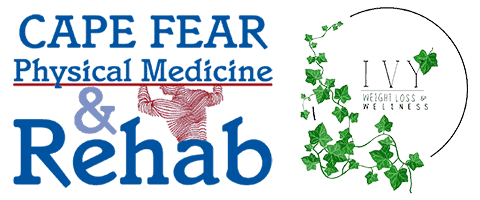Does High Cholesterol Cause Weight Gain?
High cholesterol does not directly cause weight gain. However, the factors contributing to high cholesterol, such as unhealthy eating habits and a sedentary lifestyle, can also lead to weight gain. At Cape Fear Physical Medicine and Rehab, our professional team emphasizes the importance of managing both cholesterol levels and weight through personalized care, balanced nutrition, and effective exercise routines. Contact us today for more information, or schedule an appointment online! We are conveniently located at 1540 Purdue Dr, Ste. 200, in Fayetteville, NC 28303.


Table of Contents:
Can high cholesterol cause weight gain?
How does high cholesterol affect metabolism and weight?
Is there a link between high cholesterol and abdominal weight gain?
Can lowering cholesterol help with weight loss?
At Cape Fear Physical Medicine and Rehab, we understand that managing cholesterol and maintaining a healthy weight are crucial components of your overall physical health and rehabilitation journey. High cholesterol itself doesn’t directly cause weight gain, but it can contribute to factors that may make weight management more challenging. Elevated cholesterol levels often correlate with insulin resistance, a condition where the body’s cells become less responsive to insulin. This can result in higher blood sugar levels and a higher tendency to store fat, especially around the abdomen. These metabolic disruptions can make it harder for individuals to lose weight or maintain a healthy body composition.
Additionally, high cholesterol is frequently associated with lifestyle factors such as poor diet, lack of physical activity, and obesity. These factors not only elevate cholesterol but also promote fat accumulation. If left unmanaged, high cholesterol can disrupt hormone production, further promoting fat storage and impeding weight loss efforts. By addressing cholesterol through dietary changes, physical activity, and medical interventions, individuals can improve both their cholesterol levels and their ability to manage weight more effectively.
At Cape Fear Physical Medicine and Rehab, we partner with you every step of the way to develop individualized strategies for managing cholesterol, achieving a healthy weight, and ultimately enhancing your wellness and quality of life.
We understand that managing cholesterol is essential not only for cardiovascular health but also for achieving optimal metabolic function and healthy weight management.
Elevated cholesterol levels can negatively impact the body’s metabolism through several interconnected mechanisms. Cholesterol plays a vital role in hormone production, digestion, and cellular function. However, when cholesterol levels become too high, it can disrupt metabolic processes. Research has shown that elevated cholesterol often coincides with insulin resistance, where the body’s cells become less responsive to insulin. This can lead to increased blood sugar levels and potentially the development of type 2 diabetes.
High cholesterol can also impair the body’s metabolic efficiency, making it more challenging to lose weight and maintain a healthy body composition. Cholesterol serves as a precursor for important hormones, such as cortisol, testosterone, and estrogen. When cholesterol is elevated, hormone production and balance can be disrupted, leading to increased fat storage, especially in the abdominal region. Additionally, elevated cholesterol is often linked to poor dietary habits, inactivity, and obesity, all of which directly impact metabolic health and contribute to weight gain. In summary, high cholesterol can affect metabolism by contributing to insulin resistance, hormonal imbalances, and a slowed metabolism, all of which can make weight management more difficult.
Our dedicated team is committed to helping you manage cholesterol effectively through individualized care focusing on lifestyle modifications, nutritional guidance, and physical rehabilitation therapies. Our goal is to empower you to improve your metabolic health, maintain a healthy weight, and enhance your overall quality of life.
We recognize that high cholesterol levels and abdominal weight gain often occur together and significantly impact your overall health, function, and quality of life. Our team understands the interconnected nature of these conditions and their influence on musculoskeletal function, mobility, and chronic pain management.
High cholesterol can be closely linked to abdominal weight gain, especially when poor lifestyle choices are involved. Elevated cholesterol levels are often a result of unhealthy habits such as consuming a diet high in saturated fats, processed foods, and refined sugars. These dietary choices, combined with a lack of physical activity, not only contribute to high cholesterol but also promote fat accumulation in the abdominal region. Abdominal fat, particularly visceral fat, is more harmful than fat stored in other areas of the body because it surrounds vital organs, including the liver and pancreas, which can disrupt normal metabolic functions and contribute to further health issues.
Moreover, excess abdominal fat can worsen cholesterol problems. Visceral fat produces inflammatory molecules that interfere with the body’s ability to regulate cholesterol, increasing the levels of harmful substances in the blood. This creates a harmful feedback loop where high cholesterol promotes fat accumulation, and abdominal fat, in turn, exacerbates cholesterol imbalances. Adopting a healthy lifestyle that includes a balanced diet rich in fruits, vegetables, lean proteins, and healthy fats, along with regular physical activity, is key to breaking this cycle. By managing cholesterol levels and reducing abdominal fat, individuals can significantly reduce their risk of heart disease and other related health conditions.
At Cape Fear Physical Medicine and Rehab, we are committed to helping our patients recognize and effectively manage abdominal obesity and high cholesterol levels, ultimately reducing cardiovascular risk and promoting healthier, more active lifestyles.
Lowering cholesterol can play a supportive role in weight loss by promoting healthier lifestyle changes. While reducing cholesterol levels doesn’t directly cause weight loss, the dietary and exercise adjustments made to improve cholesterol often help manage weight effectively. A heart-healthy diet, rich in fruits, vegetables, whole grains, lean proteins, and healthy fats, reduces both cholesterol and calorie intake, contributing to better weight control.
Regular physical activity further supports this process by improving cardiovascular health and boosting metabolism. As individuals engage in exercise, they burn more calories, build muscle, and improve their overall physical function. Weight loss can also have a positive effect on cholesterol, especially when abdominal fat is reduced, leading to lower cholesterol levels and a decrease in cardiovascular risk.
By making sustainable lifestyle changes—such as improving diet and increasing physical activity—individuals can not only lower cholesterol but also manage weight more effectively, creating a positive feedback loop that enhances both heart health and overall well-being.
At Cape Fear Physical Medicine and Rehab, your health and vitality are at the heart of everything we do. Contact us or book a consultation and experience personalized care and start your journey to better health today. We are conveniently located at 1540 Purdue Dr, Ste. 200, in Fayetteville, NC 28303. We serve patients from Fayetteville NC, Woodfield NC, Hope Mills NC, Fort Bragg NC, Eastover NC, and surrounding areas.

Check Out Our 5 Star Reviews


Additional Services You May Like
▸ Weight Loss & Wellness Program
▸ Botox for Migraine
▸ EMG Nerve Conduction Studies
▸ Epidural Steroid Injections
▸ Radiofrequency Ablation
▸ Rehabilitation Consultations
▸ Facet Injections
▸ Sacroiliac Joint Injections
▸ Joint Injections
▸ Genicular Nerve Blocks
▸ Prosthetic Evaluation/Management
▸ Adjuvant Therapy/Care
▸ Spasticity Management
▸ Stroke Treatment
▸ Multiple Sclerosis
▸ Spinal Cord Injury
▸ Traumatic Brain Injury
▸ Lifestyle Medicine
▸ Phentermine
▸ Qsymia
▸ Contrave

Additional Services You May Like
▸ Weight Loss & Wellness Program
▸ Botox for Migraine
▸ EMG Nerve Conduction Studies
▸ Epidural Steroid Injections
▸ Radiofrequency Ablation
▸ Rehabilitation Consultations
▸ Facet Injections
▸ Sacroiliac Joint Injections
▸ Joint Injections
▸ Genicular Nerve Blocks
▸ Prosthetic Evaluation/Management
▸ Adjuvant Therapy/Care
▸ Spasticity Management
▸ Stroke Treatment
▸ Multiple Sclerosis
▸ Spinal Cord Injury
▸ Traumatic Brain Injury
▸ Lifestyle Medicine
▸ Phentermine
▸ Qsymia
▸ Contrave







